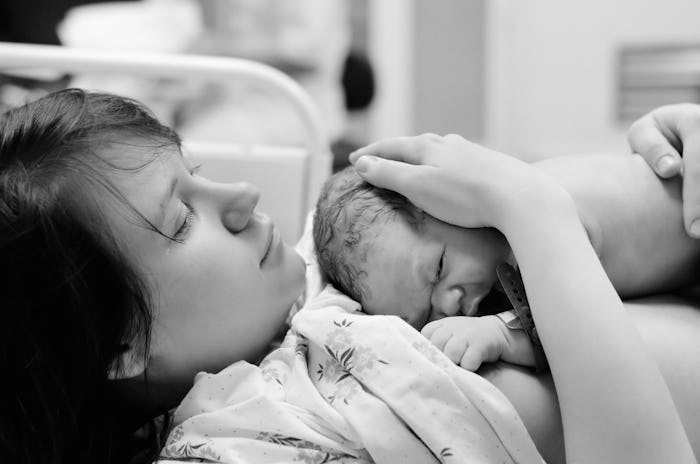Life

9 Things That Happen To Your Baby In The First 30 Minutes After Being Born
When the day of your baby's birth finally arrives, it will likely all be a bit of a blur. Regardless of how smooth or complicated your labor is, you'll forget about everything else happening around you once your baby is in your arms. However, some of the things that happen to your baby in the first 30 minutes after being born are pretty important to know about. So learning about the standard procedures of hospitals for newborns will help you have less to worry about once your little one is finally here.
Everything from cleaning, to weighing, to breastfeeding for the first time will happen within a short period of time. Even though it will likely feel like there are a million people buzzing around you, the only thing that really matters is that your baby is healthy and here.
These steps are all routine. And though there are a few optional things, having a bit of a plan for after your baby is born will give you even more confidence. You can even tell your doctor or nurse ahead of time what you prefer for your baby after birth so that when the time comes you can focus on bonding with your baby without worrying as much about the details, like these common practices that happen immediately after your baby is born.
1They'll Be Placed On Your Chest To Be Warmed & Cleaned
According to Baby Center, when babies are first born, they're unable to regulate their body temperature. But placing them on your chest will allow doctors to clean your baby up while you have the first bonding moments.
2Their Umbilical Cord Will Be Cut
At some point in the first few minutes after birth, the doctors or your partner will cut the umbilical cord. According to USA Today, research suggests that it may be best to wait a few minutes to clamp the umbilical cord because it allows iron-rich blood from the placenta to reach the newborn.
3Their Nose & Mouth Will Be Suctioned
Although there are several studies debating the need for suctioning in the first place, it's still standard practice for doctors to suction your baby's nose and mouth right after birth to clear their airways of any mucus and amniotic fluid.
4You'll Nurse For The First Time
In most hospitals, it's standard practice for the baby to be placed onto the mother's chest almost immediately after birth. Breastfeeding as soon as possible after birth has numerous benefits including mother-baby bonding and establishing a healthy nursing relationship, according to MedScape.
5They'll Take The APGAR Test
The APGAR test is performed one to five minutes after birth to determine how well baby is doing after delivery. According to MedLine, the doctor or nurse will test your baby's breathing, heart rate, muscle tone, skin color, and reflexes. The score is from one to ten, with ten being the best score.
6They'll Be Weighed And Measured
According to Parents, after the initial round of testing, your baby will be weighed and measured and likely have their foot and fingerprints taken.
7They'll Get A Vitamin K Shot
Although the vitamin K shot is technically optional, the Centers for Disease Control and Prevention noted that all babies are born with low levels of vitamin K. The initial shot is believed to help their blood clot and decrease their risk of bleeding.
8If You Had A C-Section...
Things will likely be a bit different if you had a C-section. Although many hospitals take every precaution to make the transition from C-section births as smooth as possible, oftentimes the mother isn't able to hold the baby right away. In these cases, Parents noted that the baby will be given to the partner or a nurse after they're cleaned up a bit.
9If There's An Emergency...
In emergency situations, your baby may need to be taken to the NICU and may not be able to be experience the "normal" first steps after birth.